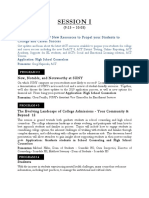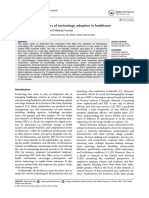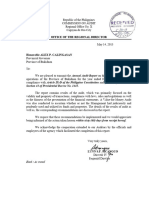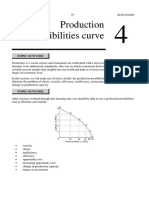Critical Analysis
Critical Analysis
Uploaded by
api-284910644Copyright:
Available Formats
Critical Analysis
Critical Analysis
Uploaded by
api-284910644Original Title
Copyright
Available Formats
Share this document
Did you find this document useful?
Is this content inappropriate?
Copyright:
Available Formats
Critical Analysis
Critical Analysis
Uploaded by
api-284910644Copyright:
Available Formats
Running head: CRITICAL ANALYSIS
Critical Analysis: Methodist Action Program (M.AP.)
The Youth Moving Forward Truancy Intervention Program
Wilmington University
CRITICAL ANALYSIS
Critical Analysis: Methodist Action Program (M.A.P.)
The Youth Moving Forward Truancy Intervention Program
The Methodist Action program (M.A.P.) is a faith based non-profit organization that has a
few different community based youth programs that fall under the umbrella of their youth
moving forward programs. The organization is currently sponsored by the Peninsula Delaware
Conference of the United Methodist Church. The Truancy Intervention Program is a program
geared to helping the youth of New Castle County Delaware who are having problems attending
school on a regular basis. Truancy according to the Christina School District student manual
(2014) is defined as followed:
A student enrolled in grades k through 12 inclusive is considered truant if such a student
has been absent from school without valid excuse, as defined in Rules and Regulations of
the State Board of Education, for more than three (3) cumulative or consecutive school
days during a given school year. Schools will take action regarding unexcused absences
including, but not limited to, written communications, home visits, required
parent/guardian conferences, and referral of the parent for prosecution (truancy charges).
A parent/guardian who is determined to violate the States compulsory school attendance
laws is subject to penalties as described by State law.
The truancy intervention program is a program that steps in and feels the gap between truant
students, court, and school. The programs headquarters is located in the Southbridge section of
Wilmington Delaware within the Neighborhood House. The program provides guidance for
youth who are truancy court ordered to either the truancy intervention program directly or to the
Douglas Alternative School, which the truancy intervention program has partnered with. The
CRITICAL ANALYSIS
program not only deals with truancy issues with the youth that are taking part but also working
on independent living skills that will help the students establish, work towards, and achieve
goals. The program provides group and individual settings to try a direct the youth in to a more
positive direction by way of decision making and caring for themselves as well as others. The
truancy intervention program will attend court dates with the youth involved in the program and
work along with the judges and school paras to give each youth fighting chance to work
themselves back to their regular home school within New Castle County Delaware. The program
will also work with the parents and guardians who need help by pairing them with services that
they may need in order to provide the best possible learning environment for the students.
The students target populations that are eligible for the program are from grades seventh
thru tenth and ages thirteen to eighteen. The students will be court ordered by truancy court 10
and are registered in a New Castle County Public, Charter, Private, or Alternative school. The
program will host anywhere from ten to twenty-five students because the program is just getting
off the ground. Anytime something is getting off the ground of course obstacles will raise and
that is when management will step in to make sure things go according to plan.
The management team is very small at the current moment with only two pay roll
employees and one intern. There is an executive director and site-supervisor that have assigned
titles and assigned responsibilities. As the intern my role is to shadow, take notes, learn, assist
when it is needed, and ask questions about thinks that I do not know or understand. That is
currently the make-up of the managerial team that is in place.
The truancy intervention program is managed in a passive/aggressive manner. Why
passive/aggressive one would ask and I would answer by saying the executive director wants
CRITICAL ANALYSIS
results and he has been very successful professionally with just about everything that he has done
in his life but with that being said he hired a site supervisor and basically told him to run it but he
has not equipped him with a curriculum or any help in implementing a curriculum. He is quick
to criticize what is not being done but not recognizing what is being done and how to improve. I
would also say that the executive director is absent from the program. There is no way that a
person can have a pulse on a program by only being in the office for two to three hours a week
and you do not trust the person you hired to do a job. When it comes to the leg work he is
probably unknown to most of the school heads that the site supervisor has developed
relationships with. When it comes to the students that are involved in the program they do not
know who he is because he does not come outside of the program to represent the truancy
intervention program. If I where the director I believe my management style would be different
for the programs success.
The first thing that I would do as an executive director would be to develop the
curriculum for the program that I want to head. I would look at the history of a program with
some success and improve it to help out my clientele. I would then hire someone that I trust and
can be on the same page with when it comes to the implementation and tracking of the programs
success. I would be in the building and go with my site supervisor to the courts, schools, home
visits, and outings to develop a professional functioning relationship as well as a repor with the
clients. One person developing, implementing, and keeping track of twenty five youth that are
truant is almost impossible. Lastly, I would be there for my staff and take an interest in how I
can lead them better by being honest with myself. There are somethings that are going on
currently in the program that I do like and I would continue as the executive director. Because of
my site supervisors experience and networking abilities I would support his ability to make
CRITICAL ANALYSIS
connections with other agency heads for example, principals, directors, education specialist etc
I would continue to give him the freedom to go out in the field and be present as a Black male
figure for the students in the program. A lot of the children in the program do not trust a lot of
people because people have told them that they will be there for them but they are not present
when the student looks for them. Lastly, I would keep the Peninsula Delaware Conference of the
United Methodist Church satisfied with the progress of the truancy intervention program in order
to continue the financial support that they are already supplying.
When it comes to funding and the financial stability of the program the truancy
intervention program has to have success and be influential in the communities that it services.
The Peninsula Delaware Conference of the United Methodist Church has been around for years
and is stable in its own right however that does not mean that it will support a program that is
failing in its mission or failing the students in the truancy intervention program. I would also do
some grant writing for federal, state, and local government funding to be less of a burden on the
only financial support group that the program currently has. I would also look into fund raising
that the students want to develop and have input in that way they will feel a part of the success of
the program and as the mature and get older they might give back in any way possible.
One of the ways the program will improve is by hiring other employees to continue to
build the program. If I was the director I would look for different types of employees. Although
some of these employees would be different in their own professional manner by way of
specialty areas they would all share the willingness to want to put students before themselves.
They would all be driven and versatile in the way the carry out the mission of the program. All
the employees would care for other people and they could take and give feedback but remain
professional at all times. Lastly, they would want to be a positive influence on the lives of
CRITICAL ANALYSIS
troubled youth and not be afraid to think outside the box without breaking any policies or
procedures. The type of interns I would want for the program are go getters and they want to
learn the program inside and out. They would want to have such a good experience that they
know what they are doing and possibly come back to either become an employee or a volunteer.
I would like for the interns to feel comfortable and ask questions and share their experiences that
could possibly lead to new and exciting ideas.
CRITICAL ANALYSIS
7
References
Christina School District (2014). Student manual. Retrieved on March, 11, 2015.
Methodist Action Program (2014). Youth moving forward: The Methodist action program
Retrieved on February 17, 2014
You might also like
- Home Health Care Services Business Plan Sample - Financial PlanDocument11 pagesHome Health Care Services Business Plan Sample - Financial Plangauravj180% (1)
- Ead 513 Clinical Field Experience A Shaping School Culture Interview and ObservationDocument5 pagesEad 513 Clinical Field Experience A Shaping School Culture Interview and Observationapi-309737337100% (2)
- Jataka Parijata Vol 1 3 PDFDocument1,094 pagesJataka Parijata Vol 1 3 PDFSiva Prasad Tata100% (3)
- Park Tickets: Important DetailDocument6 pagesPark Tickets: Important DetailKathy 1No ratings yet
- Educ 696 Course Project Proposal - HarpoldDocument5 pagesEduc 696 Course Project Proposal - Harpoldapi-272225353No ratings yet
- Group Discussions On Rupas Case StudyDocument10 pagesGroup Discussions On Rupas Case Studyapi-338118223100% (1)
- Edld 7430 Career Trajectory PaperDocument8 pagesEdld 7430 Career Trajectory Paperapi-245166476No ratings yet
- Prof Dev PlanDocument7 pagesProf Dev Planapi-282844907No ratings yet
- Program Adminstration Scale PaperDocument9 pagesProgram Adminstration Scale Paperapi-301170257No ratings yet
- Program Management FinalDocument8 pagesProgram Management Finalapi-285240070No ratings yet
- Program Evaluation PlanDocument8 pagesProgram Evaluation Planapi-292022697No ratings yet
- Management System Paper 2Document8 pagesManagement System Paper 2api-340244643No ratings yet
- Project 2 Part 1 2Document6 pagesProject 2 Part 1 2api-308398686No ratings yet
- Aiou B.edDocument14 pagesAiou B.edrhina56789No ratings yet
- Art of MentoringDocument5 pagesArt of MentoringKalyani HariharanNo ratings yet
- Reaching Our Neediest Children: Bringing a Mental Health Program into the Schools: A Guide to Program ImplementationFrom EverandReaching Our Neediest Children: Bringing a Mental Health Program into the Schools: A Guide to Program ImplementationNo ratings yet
- Career Trajectory PaperDocument11 pagesCareer Trajectory Paperapi-337540831No ratings yet
- Midtermreflection LamarrelaurentDocument3 pagesMidtermreflection Lamarrelaurentapi-283808109No ratings yet
- Take Home Final SubmitDocument19 pagesTake Home Final Submitapi-257743672No ratings yet
- Field Agency OoyDocument5 pagesField Agency Ooyapi-302180163No ratings yet
- Hilldorfer Capstone PaperDocument7 pagesHilldorfer Capstone Paperapi-283602689No ratings yet
- Statement of Professional Philosophy 2 1Document8 pagesStatement of Professional Philosophy 2 1api-403399419No ratings yet
- Final Reflection PaperDocument4 pagesFinal Reflection Paperapi-300650272No ratings yet
- WebDescriptions Session1Document3 pagesWebDescriptions Session1crbrunelliNo ratings yet
- Practice Model PaperDocument14 pagesPractice Model Paperapi-374006892No ratings yet
- My Philosophy of School Counseling ProgramsDocument6 pagesMy Philosophy of School Counseling Programsapi-285240070No ratings yet
- Duties & Resonsilbilities of A Social WorkerDocument4 pagesDuties & Resonsilbilities of A Social WorkerCynthia Carol JoshuaNo ratings yet
- EXPLANATIONDocument7 pagesEXPLANATIONMarcel De La CruzNo ratings yet
- Portfolio Areas of GrowthDocument9 pagesPortfolio Areas of Growthapi-438185399No ratings yet
- Molly Maher - PLP - Updated 2021Document4 pagesMolly Maher - PLP - Updated 2021api-551968447No ratings yet
- Standard 5 ReflectionDocument2 pagesStandard 5 Reflectionapi-315190146No ratings yet
- Urbana School District Homework BlogDocument7 pagesUrbana School District Homework Blogernye9n5100% (1)
- Pre-Assessment EvaluationDocument3 pagesPre-Assessment Evaluationapi-297189068No ratings yet
- Lamarre Career TrajectoryDocument6 pagesLamarre Career Trajectoryapi-283808109No ratings yet
- Grant 06 11 16 Quoteassign2Document5 pagesGrant 06 11 16 Quoteassign2api-297021169No ratings yet
- The Role Played by School Counselors Is Often MisunderstoodDocument2 pagesThe Role Played by School Counselors Is Often Misunderstoodadine66No ratings yet
- Naeyc Statement of CommitmentDocument4 pagesNaeyc Statement of Commitmentapi-282611337No ratings yet
- WebDescriptions Session1Document4 pagesWebDescriptions Session1crbrunelliNo ratings yet
- Cspu 618 Capstone Project PaperDocument15 pagesCspu 618 Capstone Project Paperapi-385785434No ratings yet
- Professional School Counselor PortfolioDocument57 pagesProfessional School Counselor Portfolioapi-302321580No ratings yet
- Running Head: Evaluation of Practice Paper 1: Fe2598@wayne - EduDocument7 pagesRunning Head: Evaluation of Practice Paper 1: Fe2598@wayne - Eduapi-249417164No ratings yet
- JunemonthlyinternreportsignedDocument4 pagesJunemonthlyinternreportsignedapi-294396264No ratings yet
- ReflectionDocument3 pagesReflectionapi-238773232No ratings yet
- Program AuditDocument12 pagesProgram Auditapi-267943056No ratings yet
- Capstone ProjectDocument17 pagesCapstone Projectapi-394728132No ratings yet
- FinalprojectproposalDocument7 pagesFinalprojectproposalapi-350497771No ratings yet
- Ed 695b Reflection EssayDocument11 pagesEd 695b Reflection Essayapi-512205356No ratings yet
- WebDescriptions SessionIIDocument4 pagesWebDescriptions SessionIIcrbrunelliNo ratings yet
- Critical Analysis ReportDocument4 pagesCritical Analysis Reportapi-243106884No ratings yet
- Collaboration As A School CounselorDocument6 pagesCollaboration As A School CounselorRobin Henderson-RichardsNo ratings yet
- Alana - Ac301 - Reflection PaperDocument1 pageAlana - Ac301 - Reflection Paperkate trishaNo ratings yet
- 1 5 ReflectionDocument4 pages1 5 Reflectionapi-284061543No ratings yet
- Social Work Courses January 2015Document8 pagesSocial Work Courses January 2015afjwdxrctmsmwf100% (2)
- Final Paper 315Document4 pagesFinal Paper 315api-282771038No ratings yet
- YDL Initiative PaperDocument10 pagesYDL Initiative PaperstojannaNo ratings yet
- Thesis Statement Early Childhood EducationDocument5 pagesThesis Statement Early Childhood Educationafknowudv100% (1)
- Professional EssayDocument4 pagesProfessional Essayapi-282231910No ratings yet
- Comprehensive School Counseling ProgramDocument8 pagesComprehensive School Counseling Programapi-717187506No ratings yet
- WebDescriptions Session1Document4 pagesWebDescriptions Session1crbrunelliNo ratings yet
- Peer Helping Brochure and National StandardsDocument3 pagesPeer Helping Brochure and National StandardsJahid HasanNo ratings yet
- Critical Analysis ReportDocument4 pagesCritical Analysis Reportapi-284800011No ratings yet
- Portfolio SW 4020 Organizational AnalysisDocument10 pagesPortfolio SW 4020 Organizational Analysisapi-282606106No ratings yet
- Exploring The Motivators of Technology Adoption in HealthcareDocument15 pagesExploring The Motivators of Technology Adoption in HealthcareQuang Danh PhạmNo ratings yet
- Kason Indus v. Allpoints Foodservice - Order Granting MTDDocument19 pagesKason Indus v. Allpoints Foodservice - Order Granting MTDSarah BursteinNo ratings yet
- Ce510 1Document1 pageCe510 1api-548943155No ratings yet
- Subcontractor Agreement Template SignaturelyDocument4 pagesSubcontractor Agreement Template SignaturelyRaphael Mana-ayNo ratings yet
- Sept23-Attendance Taisho MizaDocument3 pagesSept23-Attendance Taisho MizaFendy 27No ratings yet
- Coca Cola PPT Case StudyDocument15 pagesCoca Cola PPT Case StudyKrutarth Patel80% (10)
- J. Calvin: Text By: Joanne Mayhew Illustrated By: Emanuele TagliettiDocument16 pagesJ. Calvin: Text By: Joanne Mayhew Illustrated By: Emanuele Tagliettipetermyintsoe5687No ratings yet
- CVP ProblemsDocument6 pagesCVP ProblemsKronisa ChowdharyNo ratings yet
- Sps GradesDocument26 pagesSps GradesElona Jane LaredoNo ratings yet
- Bukidnon2012 Audit ReportDocument157 pagesBukidnon2012 Audit ReportQuint Reynold DobleNo ratings yet
- Oblicon Reviewer - Dean Del CastilloDocument30 pagesOblicon Reviewer - Dean Del CastilloKat MirandaNo ratings yet
- Paul Anka My Live My Songs: Click For NextDocument3 pagesPaul Anka My Live My Songs: Click For Nextprofmirtanapoli@hotmail.com100% (2)
- The Story of Imam Bashir Shah LADocument8 pagesThe Story of Imam Bashir Shah LADar-ul-Uloom TrollabandNo ratings yet
- No2. RMI - EMRT - 1.3Document146 pagesNo2. RMI - EMRT - 1.3dinhhiep252891No ratings yet
- Lesson 1 Preventive MaintenanceDocument3 pagesLesson 1 Preventive MaintenanceLuis Fernando Arozena PiñaNo ratings yet
- Typo SquattingDocument1 pageTypo SquattingHammad ArifNo ratings yet
- Ukn Indonesian College of Obstetrics and GynecologyDocument13 pagesUkn Indonesian College of Obstetrics and GynecologyRizka AdiNo ratings yet
- Computer Applications: Engleski Jezik IDocument6 pagesComputer Applications: Engleski Jezik ILeo BrdarNo ratings yet
- Topic 4Document36 pagesTopic 4mphoNo ratings yet
- Rotary X PNEC NewDocument15 pagesRotary X PNEC NewAreeb ArshadNo ratings yet
- Fdocuments - in Anekal Lpa Provisional ZR 2031Document263 pagesFdocuments - in Anekal Lpa Provisional ZR 2031kpr1080No ratings yet
- 1 Proposition Monisha BDocument2 pages1 Proposition Monisha BPriyanka YadavNo ratings yet
- Classic DanceDocument13 pagesClassic DanceRajnish KumarNo ratings yet
- Akbars Religious PolicyDocument5 pagesAkbars Religious Policysatya dewanNo ratings yet
- Don't Go To Hell!Document12 pagesDon't Go To Hell!lucfadadNo ratings yet
- Master Thesis Peace and ConflictDocument6 pagesMaster Thesis Peace and Conflictmichellejohnsoncharleston100% (2)
- Potential Legal Impact of The Proposed Domestic Legal Union Amendment To The North Carolina ConstitutionDocument31 pagesPotential Legal Impact of The Proposed Domestic Legal Union Amendment To The North Carolina ConstitutionbluebermudaNo ratings yet

























































































